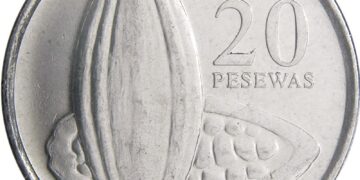Confusion Over Ghana’s 20 Pesewa Coin: Is It Still Legal Tender?
A quiet but worrying trend is emerging across Ghana. From bustling markets to roadside shops, traders, drivers, and service providers are rejecting the 20 pesewa coin, leaving many consumers frustrated and wondering: is this coin still legal tender?
Over the years, the Bank of Ghana has introduced several coin denominations, 1, 5, 10, 20, and 50 pesewas as well as the one-cedi and two-cedi coins for the purchase of small items. But over time, the smaller ones slowly disappeared from daily use, leaving only the 20 and 50 pesewa coins, alongside the 1 and 2 cedi coins, in circulation.
Now, even the 20 pesewa coin seems to be fading away. Traders and drivers say customers reject it whenever it is offered as change, forcing them to stop accepting it altogether.
A Coin Nobody Wants
I’ve personally experienced this awkward situation more than once. One hot afternoon at Kaneshie, I visited a public washroom and was charged GH₵1. I offered five 20 pesewa coins, but the attendant shook her head and refused to take them.
A similar thing happened in Kasoa. I tried to buy a sachet of water costing 50 pesewas and handed the seller two 20 pesewa coins and one 10 pesewa coin. She frowned and said simply, “We don’t take that anymore.”
A few other vendors I spoke to shared the same response.
“People don’t want the 20 pesewa coin. When we give it to them, they also refuse it,” said Sister Ama (not her real name), a trader at Kasoa.
No Official Withdrawal
Despite the growing rejection, there has been no official statement from the Bank of Ghana suggesting that the 20 pesewa coin has been withdrawn from circulation.
Under the Currency Act, 1964 (Act 242), all coins and notes issued by the Bank of Ghana remain legal tender unless they have been officially demonetised.
“If the Bank of Ghana wants us to stop using the 20 pesewa coin, then they should announce it. I don’t understand why even pure water sellers reject it. I have a lot of them at home, but I can’t use them,” said one frustrated customer who wished to remain anonymous.
The central bank’s silence has created confusion among the public. Many now question whether the 20 pesewa coin is still worth anything or if it has quietly been abandoned without notice.
Time for Clarity
It’s time for the Bank of Ghana to step in and clear the air. If the coin has indeed been phased out, the public deserves an official announcement and a process for exchanging them.
But if it remains legal tender, then there must be renewed public education to ensure that traders, drivers, and consumers all accept it in everyday transactions.
If left unchecked, the continued rejection of the 20 pesewa coin could slowly erode public confidence in smaller denominations and make small-scale transactions unnecessarily difficult.
After all, money, no matter how small its value only works when everyone believes in it.
The mystery of the 20 pesewa coin may seem trivial, but for market women, trotro drivers, and everyday commuters, it’s a reminder that even the smallest coins deserve clarity, respect, and a place in Ghana’s financial system.
Written by Prince Antwi
(Nana Antwi Bosiako)
Prince Antwi is a journalist with Happy FM




















